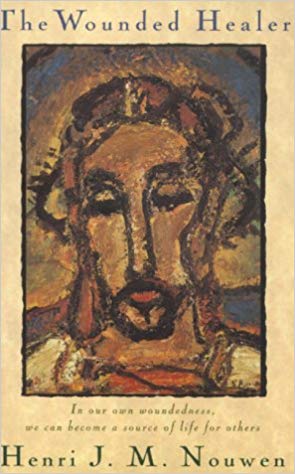Amazon said this: "In this book, Henri Nouwen combines creative case studies of ministry with stories from diverse cultures and religious traditions in preparing a new model for ministry. Weaving keen cultural analysis with his psychological and religious insights, Nouwen has come up with a balanced and creative theology of service that begins with the realization of fundamental woundedness in human nature. Emphasizing that which is in humanity common to both minister and believer, this woundedness can serve as a source of strength and healing when counseling others. Nouwen proceeds to develop his approach to ministry with an analysis of sufferings -- a suffering world, a suffering generation, a suffering person, and a suffering minister."
This book is a class for a reason. We are all called to love and to heal in spite of our own wounds. Our wounds, in turn, help others heal.
There are sections of the book that are hard to read, but I will forever appreciate the needed humility of understanding our own woundedness. As a Christian we are always aware that our Great Healer came to us through the wounds of crucifixion and through our own wounds. The last chapter of the book should be required reading for all who minister to others.
I would like to give you some quotes from the book that were thought-provoking for me.
"...I realize that I have done nothing more than rephrase the fact that the Christian leader must be in the future what he has always had to be in the past: a man of prayer, a man who has to pray, and who has to pray always. That I bring up this simple fact at this point may be surprising, but I hope I have succeeded in taking away all the sweet, pietistic, and church aura attached to this often misused word." (p 47)
"For a man of prayer is, in the final analysis, the man who is able to recognize in others the face of the Messiah and make visible what is hidden, make touchable what was unreachable. The man of prayer is a leader precisely because through his articulation of God'w work within himself he can lead others out of the confusion to clarification; through his compassion he can guide them out of the closed circuits of their in-groups to the wide world of humanity; and through critical contemplation he can convert their convulsive destructiveness into creative work for the new world to come." (p 47)
"... it has become clear that Christian leadership is accomplished only through service. This service requires the willingness to enter into a situation, with all the human vulnerabilities a man has to share with his fellow man. This is a painful and self-denying experience, but an experience which can indeed lead man out of his prison of confusion and fear. Indeed, the paradox of Christian leadership is that way out is the way in, that only by entering into communion with human suffering can relief be found." (p 77)
"Even when we know that we are called to be wounded healers, it is very difficult to acknowledge that healing has to take place today. Because we are living in days when our wounds have become all too visible. Our loneliness and isolation has become so much a part of our daily experience, that we cry out for a Liberator who will take us away from our misery and bring us justice and peace." (p 95)
This paragraph followed: "To announce, however, that the Liberator is sitting among the poor and that the wounds are signs of hope and that today is the day of liberation, is a step very few can take. But is is exactly the announcement of the wounded healer: 'The master is coming - not tomorrow, but today, not next year, but this year, not after all our misery has passed, but in the middle of it, not in another place but right here where we are standing." (p 95)
"If indeed we listen to the voice and believe that ministry is a sign of hope, because it makes visible the first rays of light of the coming Messiah, we can make ourselves and others understand that we already carry in us the source of our own search. Thus ministry can indeed be a witness to the living truth that the wound, which causes us to suffer now, will be revealed to us later as the place where God intimated his new creation." (p 95-96)
"When the imitation of Christ does not mean to live a life like Christ, but to live your life as authentically as Christ lived his, then there are many ways and forms in which a man can be a Christian. The minister is the one who can make this search for authenticity possible, not by standing on the side as neutral screen or an impartial observer, but as an articulate witness of Christ, who puts his own search at the disposal of others. This hospitality requires that the minister know where he stand and whom he stands for, but it also requires that he allows others to enter his life, come close to him and ask him how their lives connect with his." (p 99-100)
"What we can know ... is that man suffers and that a sharing of suffering can make us move forward. The ministry is called to make this forward thrust credible to his many guests, so that they do not stay but have a growing desire to move on, in the conviction that the full liberation of man and his world is still to come."
There is so much to reflect on in this short but deeply rich little book! I would say it's an excellent reading choice for Lent, the church season right before Easter.

 RSS Feed
RSS Feed